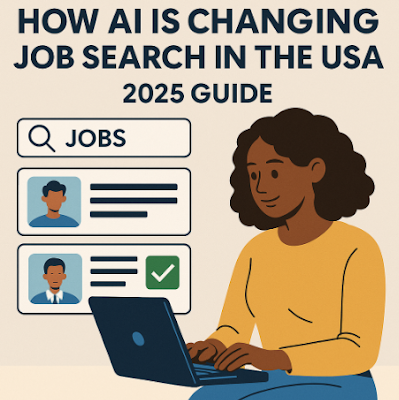How AI Is Changing Job Search in the USA (2025 Guide)
From Resumes to Interviews — How Artificial Intelligence is Transforming the Way We Get Hired
Introduction: A New Era of Job Hunting Has Arrived
Remember the days of printing out your resume and going door-to-door with job applications? Or endlessly refreshing job boards, waiting for that one opportunity to click?
Fast forward to 2025 — the job search landscape in the USA has drastically changed, thanks to the rise of Artificial Intelligence (AI).
AI is no longer just a backend tool for HR departments. It’s in your job search apps, resume builders, interview prep software, and even helping recruiters predict who might be the best cultural fit. In this article, we’ll unpack how AI is impacting every stage of the job search in the USA and how you can adapt and benefit from it.
1. AI-Powered Resume Builders & Optimization Tools
Gone are the days of spending hours crafting resumes from scratch.
Real-Life Example:
Meet Emily, a recent college graduate in Texas. She used Rezi — an AI resume builder — to tailor her resume for each job listing. It helped her pass multiple ATS (Applicant Tracking Systems) scans and land three interviews in a week.
Top Tools:
-
Rezi.ai – ATS-optimized resumes.
-
Enhancv – Adds human-like storytelling to resumes.
-
Zety – AI suggestions for tone, wording, and impact.
Why it matters:
98% of Fortune 500 companies now use ATS software, according to Jobscan. A smart resume builder ensures you're not lost in the shuffle.
2. Job Matching Algorithms That Actually Work
Job boards like Indeed, ZipRecruiter, and LinkedIn now use AI-driven matching systems. These tools don't just match keywords; they analyze your behavior, experience, preferences, and even learning patterns.
Use Case:
John in Florida was tired of irrelevant job matches. After switching to Hired.com, the AI analyzed his GitHub activity and suggested roles he hadn’t even considered. He got an offer from a San Francisco-based startup within a month.
3. Smart Applications: Auto-Filling & Tailoring
AI tools like LazyApply or LoopCV help job seekers apply to hundreds of jobs automatically.
Pros:
-
Saves time (10x faster applications).
-
Customizes cover letters using AI.
-
Learns which applications got responses and adjusts accordingly.
Caution:
Pro Tip: Use these tools strategically, not just blindly applying. Recruiters still prefer personalized applications.
4. AI Interview Coaches: Practice Makes Perfect
Feeling nervous before an interview? You’re not alone. Now AI can help you prepare better than ever.
Real Use Case:
Sara, a teacher from New York pivoting to EdTech, used Interview Warmup (by Google) and Yoodli. These tools analyzed her tone, filler words, and body language (via webcam). The result? Her confidence skyrocketed — and she landed the role.
Top Tools:
-
Yoodli – AI-powered interview feedback.
-
InterviewWarmup.withgoogle.com
-
Prepper – For behavioral questions.
5. AI + Career Discovery Tools
Tools like Career Explorer by Sokanu, Eightfold, or FutureFit AI go beyond suggesting jobs — they help you discover career paths based on your skills, interests, and values.
This is perfect for:
-
Career switchers.
-
Fresh graduates.
-
Mid-career professionals burnt out by their current field.
6. AI in Recruiting: What Hiring Managers Are Using
It’s not just job seekers using AI. Recruiters in the USA are heavily relying on AI to screen, shortlist, and even conduct initial interviews.
Tools Being Used:
-
HireVue – AI-powered video interviews.
-
Pymetrics – Uses neuroscience-based games to assess soft skills.
-
Paradox Olivia – AI chatbot recruiter.
🔗 Source: SHRM on AI in Recruitment
7. AI for Diversity & Inclusion
Bias in hiring has always been a concern. Now, AI is helping eliminate unconscious bias by anonymizing resumes, removing names, ages, schools, and photos.
Companies using it:
-
Accenture
-
Google
-
Johnson & Johnson
While not perfect, tools like Applied and Blendoor are helping reshape recruitment to focus on skills — not stereotypes.
8. AI & Remote Work Opportunities
Remote jobs saw a 412% increase post-2020, and AI plays a big role in identifying flexible opportunities, analyzing job flexibility patterns, and even suggesting roles where you can work from anywhere.
Popular AI-Driven Remote Job Platforms:
-
FlexJobs
-
RemoteOK
-
AngelList Talent
9. AI-Powered Skill Training & Upskilling
Imagine this: You apply for a job, and the AI says, “You're 80% qualified — here are 2 courses to bridge the gap.”
AI platforms like:
-
Coursera
-
LinkedIn Learning
-
Skillsoft
...are integrating personalized learning journeys tied directly to job roles.
Example:
Tom, a logistics manager in Ohio, wanted to move to data analysis. FutureFit AI suggested Python and SQL. After 3 months of part-time learning, he switched careers.
10. Real Challenges to Watch Out For
Let’s be real — AI has perks, but also some risks:
Concerns:
-
Data privacy: Some tools require full access to your resume and Gmail.
-
Bias: AI can still inherit biases from its data.
-
Over-automation: One-size-fits-all messaging hurts personalization.
Pro Tips to Master Job Search with AI
-
Use AI tools, but customize the output.
-
Keep your data secure — read privacy terms.
-
Build your digital brand (LinkedIn, portfolios).
-
Use AI for speed, not for shortcutting integrity.
-
Track what’s working (interviews, replies, views).
Reference:
Forbes – AI and The Future of Work
Final Thoughts: The AI Advantage in 2025 Job Search
AI isn’t replacing job seekers — it’s empowering them.
Whether you're a fresh grad, switching careers, or re-entering the workforce, using AI in your job hunt gives you a real edge.
It’s not about being robotic. It’s about working smarter.
Let AI handle the heavy lifting — so you can focus on showcasing your unique skills and story.
“Adaptability, not automation, is the real superpower of 2025.”

Comments
Post a Comment